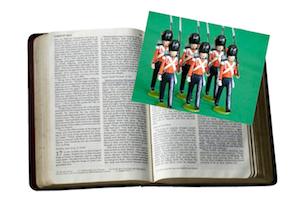 Yesterday we surveyed the New Testament with non-pacifist eyes. Today we’ll put our other lenses on.
Yesterday we surveyed the New Testament with non-pacifist eyes. Today we’ll put our other lenses on.
What are some of the passages typically used by pacifists? Here are a few that come to mind:
- The Sermon on the Mount. If Romans 13 is the trump card for their opponents, the Sermon on the Mount is the Ace of Spades for pacifists. Sayings like “Do not resist an evil man,” “Turn the other cheek,” and “Love your enemy” seem to support the pacifistic view.
- Luke 22:38. Where many non-pacifists find encouragement in Jesus’ mention of buying swords in Luke 22, pacifists point to his sharp response when the disciples produce two swords. Pacifists take “That is enough” as a rebuke of the disciples’ misunderstanding of Jesus’ words.
- Jesus’ rebuke of Peter in Gethsemane. When Peter drew a sword to defend Jesus, Jesus sharply rebuked him. Matthew records this:
“Put your sword back in its place,” Jesus said to him, “for all who draw the sword will die by the sword.” (Matthew 26:52)
- Jesus’ reply to Pilate about His kingdom:
“My kingdom is not of this world. If it were, my servants would fight to prevent my arrest by the Jews. But now my kingdom is from another place.” (John 18:36)
Pacifists argue that Jesus’ kingdom is still other worldly, so fighting is inappropriate.
- Paul’s teachings in Romans 12:14-21 about avoiding vengeance, not repaying evil with evil, and living at peace.
- The Book of Revelation. The message of Revelation, directed to an oppressed church, was one of submission and patience, not uprising and rebellion. The wicked would be punished, but not at the hands of the righteous.
Those are the primary passages that come to mind. Lots of reasoning can be done apart from these passages, both in favor of and against pacifism, but I think these are the texts that are normally referenced.
I plan to do some analysis of all of this beginning next week. For now, I want to feel that we’ve done a proper survey. So please point out any texts that have been missed along the way.

what about 2 Timothy 2? I know it’s a little confusing b/c Paul is using a military analogy, but wouldn’t his point apply to military as well? although in reverse?
2 Tim 2:4–“no one serving as a soldier gets involved in civilian affairs….”
Brian,
I have used that reasoning before. There’s a strong point to be made that if you are in the Lord’s army, you shouldn’t get caught up in the affairs of another kingdom.
Grace and peace,
Tim Archer
whatever you deside, you had better do it quickly.
The end of the world is nigh; 21 May, to be precise. That’s the date when Harold Camping, a preacher from Oakland, California, is confidently predicting the Second Coming of the Lord. At about 6pm, he reckons 2 per cent of the world’s population will be immediately “raptured” to Heaven; the rest of us will get sent straight to the Other Place.
A man who knows how to read the signs of the times (and the times of the signs)
Well for starters I think First Peter has much to say about the believer’s relationship to the powers that be. Aliens. Sojourners. Exiles. Powerful images indeed.
Sometimes I feel that the Bible presents us with a seemingly hopeless contradictory passages about violence and war. It seems to me that violence of some kind can be found on almost every page. I know that Jesus expects his followers to act in certain ways when it comes to being in the world to do his work. The bottom line is that if we are slaves to Christ, then we are expected to act as a slave should act, meaning that we shouldn’t give anyone trouble in the world. If we are beaten and abused and spit on, then, well, we’re expected to let it all happen. Even if we are killed. The justificiation is that our master, Jesus, will be the one giving payback. He’s the one who will deal with “the other”. He doesn’t want us to. Why not? Would it reflect badly on him? Would it be going against the natural order of things? Of course, we can all say that we need to stand up for what is “right” but only because that is what Jesus wants, not what we want. It’s his work we’re supposed to be doing, not our own. Which is why it doesn’t matter what happens to us. We are ordered, as good slaves, to act in a certain way. If there’s trouble, well, your master will hear about it and take care of it. So, for me Jesus is not a pacifist. Look at Revelations to show that. Does that mean I should be against war? Well, yes, that’s what my master wants. So, being odedient I’ll do what he says, with no lip service. He’ll take care of the rest. Still, the violence of this world troubles me. As it should. Moreso, the violence which God ordains and creates bothers me, too? Dare I say anything to Him? Frankly, I don’t think God or Jesus give a damn what I think.
Matteo,
I hope you’ll spend some time reading on this site. (especially the articles on peace: http://www.timothyarcher.com/kitchen/?cat=276) While I don’t claim to have all the answers, I think you’ll at least see that the contradictions aren’t as hopeless as they seem.
For example, any who use Revelation to argue against pacifism fail to recognize:
(1) The nature of apocalyptic literature; and
(2) The fact that God has reserved for himself the rights to judge and avenge. The fact that God punishes does not give man the right to exact vengeance.
Grace and peace,
Tim Archer